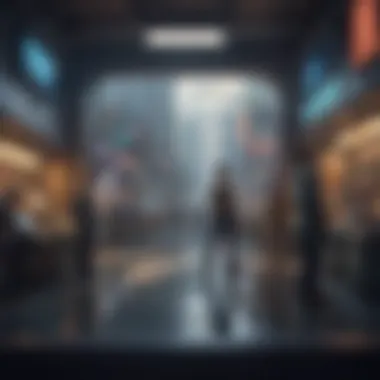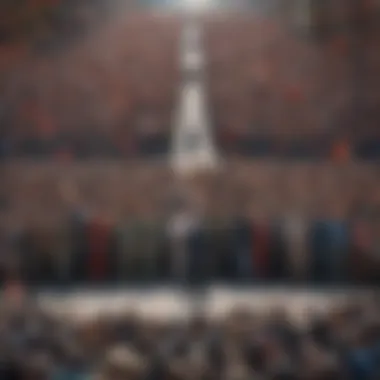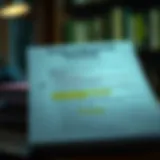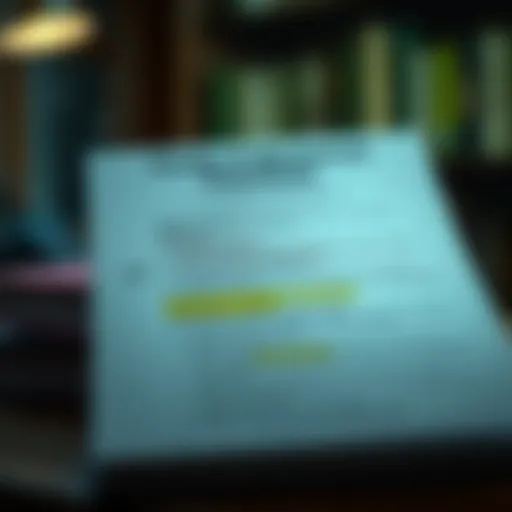Analyzing Themes and Society in Brave New World


Intro
Aldous Huxley's Brave New World offers a striking reflection on society's potential trajectory towards dystopia. While first published in 1932, many of its themes remain alarmingly pertinent today, compelling readers to confront the implications of technology, consumerism, and societal conformity. It paints a world where happiness is manufactured and individuality is sacrificed, presenting a future where mankind's essence hangs in the balance.
Key Concepts and Insights
Main Ideas from the Book
Huxley's narrative revolves around a meticulously controlled society, one that champions pleasure above all else. The principles of science and technology dominate the lives of its inhabitants. Here are a few pivotal themes that encapsulate the essence of the book:
- Controlled Happiness: Citizens are conditioned to embrace hedonism, ensuring stability but at the cost of their freedom and critical thought.
- The Role of Technology: Technology is not merely an aid but a means of domination, exemplified by the use of genetic manipulation and psychological conditioning to maintain societal order.
- Consumerism and Identity: In this world, people are reduced to commodities. The mantra “Everyone belongs to everyone else” underscores how personal connections have eroded, showcasing the perishability of individuality in favor of mass consumption.
Practical Applications of Concepts
Reflecting on the implications of Huxley's work provides a useful lens through which we can view our own society. Key takeaways include:
- Critical Thinking: The importance of questioning societal norms and the consequences of unquestioned belief in technology as a panacea.
- Dangers of Complacency: Understanding how convenience may lead to a decline in personal agency and freedom.
- Value of Relationships: Recognizing the necessity of deeper, meaningful connections in our increasingly transactional world.
"Words can be like X-rays if you use them properly—they’ll go through anything. You read and you’re pierced." – Aldous Huxley
Recommendations and Further Reading
Related Books to Explore
To deepen your understanding of similar themes posited by Huxley, consider these books:
- 1984 by George Orwell – A foundational dystopian novel that explores totalitarianism and the loss of individuality.
- Fahrenheit 451 by Ray Bradbury – A narrative examining censorship and the repercussions of a society devoid of books.
- The Giver by Lois Lowry – A young adult novel focusing on a society that sacrifices emotion and memory for the sake of uniformity.
Additional Resources for Personal Development
Apart from literature, exploring different media can provide insights into Huxley’s concerns:
- Documentaries about technology and society on platforms like Britannica or Reddit.
- Articles discussing the ethical aspects of genetic engineering and psychological conditioning.
By piecing together these reflections, a clearer tableau of Huxley’s warnings emerges—a necessary discourse for anyone navigating the modern world.
Foreword to Brave New World
Aldous Huxley’s Brave New World stands as a critical pillar in the literary canon of dystopian fiction. It emerges not just as a novel but as a cautionary tale that digs deep into human nature, the effects of technology, and the societal constructs we often take for granted. The significance of this work extends beyond its narrative; it prompts readers to question the fabric of their reality.
In this discussion, we aim to illuminate various facets of Brave New World. Understanding Huxley’s background and the environment in which he wrote is essential. This context will help readers appreciate the subtleties woven into the text. From social hierarchies to the implications of technological advancement, every element serves as a mirror reflecting contemporary issues.
Key aspects we intend to unpack include:
- The World State: how Huxley articulates a society engineered for stability at the expense of individuality.
- Technology and Control: examining the role of technology as a tool for manipulation.
- Main Characters: exploring how characters like Bernard Marx and John the Savage challenge or succumb to societal norms.
Engaging with this text allows for a deeper conversation about our modern landscape. The novel’s foresight about consumer culture and psychological manipulation rings eerily true today. By delving into the structure and themes of Brave New World, we not only explore Huxley’s predictions but also the relevance of these themes in modern society.
As we venture further into the analysis of Huxley’s work, we will capture the stark contrast between the liberties and constraints imposed by technology and societal pressures. Through this exploration, readers can gain insights that encourage reflection on their own lives and societal dynamics.
Dystopian Setting
The setting of a dystopian narrative is crucial for understanding its themes and characters. In Brave New World, Aldous Huxley crafts a world that meticulously unfolds societal flaws and human moral dilemmas in a controlled environment. The fabricated utopia, known as the World State, serves as a backdrop against which the struggles of individuals resonate. Rather than merely being a fictional playground, the setting itself acts as a character, influencing the narrative's direction and shaping its philosophical inquiries. Through examining this setting, we gain insight into not just Huxley’s concerns, but also the ramifications these issues hold in our own modern context.
The World State
Huxley’s World State illustrates a society built on stability, consumerism, and superficial happiness. Each citizen is molded from conception to ensure uniformity—one might say they’re engineered to suit the needs of the state. The pillars of this world are happiness at any cost and the eradication of individuality. Citizens are conditioned to feel contentment through hedonistic pleasures, devoid of true emotions or social complexities. The World State represents a paradox: while it promises harmony, it thrives on conformity that extinguishes the essence of humanity.


"Words can be like x-rays if you use them properly—they’ll go through anything. You read and you’re pierced."
Aldous Huxley
Technology and Control
In Brave New World, technology is not merely a tool; it’s a control mechanism that pervades every aspect of life. From genetic engineering to the pervasive use of the drug soma, Huxley depicts a society where technology governs human behavior. The citizens’ dependence on soma as a refuge from discomfort sheds light on society's growing reliance on artificial solutions to complex problems. It raises pressing questions: Where do we draw the line between necessary advancements and ethical boundaries? This exploration prompts us to critically evaluate our own relationship with technology—are we using it to enhance our lives, or are we, in effect, surrendering our agency?
Social Hierarchies
Huxley structures his society into rigid social classes, with each caste designed for specific roles. The Alphas, Betas, Gammas, Deltas, and Epsilons not only represent different intellectual and physical capabilities but also illustrate the dangers of inherent inequality. This hierarchical system is vital for maintaining the World State's stability, ensuring that each individual has their place and purpose. The very idea of social mobility is anathema to the regime, as it threatens the fragile balance of power. By exploring these social divisions, Huxley invites reflection on economic and social disparities present in our time, compelling readers to ponder whether true harmony can be achieved in a divided society.
Main Characters
In Aldous Huxley’s Brave New World, the characters are not simply vessels carrying the plot forward; they are reflections of Huxley’s critique of a society that prioritizes stability over individuality. The exploration of these central figures—Bernard Marx, Lenina Crowne, and John the Savage—illuminates the novel's personal and societal struggles within a dystopian framework. Each character’s journey presents a unique lens through which we can assess the implications of Huxley’s world, rich with philosophical and ethical dilemmas that resonate strongly with our contemporary experiences.
Bernard Marx
Bernard Marx stands out as a profoundly complex figure. Initially portrayed as an outsider within the highly structured World State, his physical stature—the result of a genetic engineering mishap—serves as a metaphor for his emotional and intellectual alienation. Bernard's discontent ignites a questioning of societal norms, making him a vehicle for Huxley’s critical perspective on conformity.
Although he yearns for individuality and deeper connections, his resort to manipulation and seeking validation from others complicates his character. He desires to break free from the constraints of his society, but ultimately, he is deeply influenced by it. His interactions with Lenina showcase a dichotomy between the desire for genuine human connection and the superficiality of state-sanctioned relationships. Moreover, Bernard’s fluctuating self-esteem often leads him to prioritize his status over his ideals. Thus, he becomes a tragic symbol of the struggle for authenticity in a world that represses it.
Lenina Crowne
Lenina Crowne embodies the spirit of the World State—a product of its conditioning and a believer in its ideals. Her character is compelling in how she reflects the tension between the programmed ethos of consumerism and the human instinct for love and desire. Lenina represents a facade of happiness that lacks deeper meaning, as she subscribes to the notion that pleasure is the antidote to pain. Her relationships are largely governed by social norms, as seen in her interactions with Bernard and the alpha male, Henry Foster.
Despite her outward confidence, Lenina grapples with a sense of emptiness when confronted with John the Savage, who challenges her worldview. Her role serves as a critique of the societal emphasis on conformity, showcasing the internal conflict of an individual indoctrinated to value personal pleasure over emotional depth. Through Lenina, Huxley vividly portrays the perils of a life devoid of genuine relationships, leaving readers to ponder the consequences of a life lived in the shadows of societal expectations.
John the Savage
John the Savage, raised outside the confines of the World State, emerges as a stark contrast to Bernard and Lenina. His existence in the Savage Reservation allows him to embody the raw emotions and values that the World State has eradicated. An embodiment of the conflict between primal human instincts and the sanitized modernity of the World State, John's character struggles with the extremes of love and pain, which ultimately leads to his tragic fate.
His encounter with Shakespeare—particularly The Tempest—infuses him with a unique understanding of language and emotion, intensifying his existential plight when he is thrust into a society that calls for emotional numbness. John's bewilderment in the World State illuminates the inherent folly of a world that seeks to eradicate suffering at the cost of humanity. His perspective on freedom starkly contrasts with the superficial happiness celebrated by society, leaving readers to contend with questions about the essence of freedom, suffering, and what it means to be truly human.
"To be happy, you must be faced with the choice of being miserable. Without this spectrum, happiness is mere illusion."
In the lens of these characters, Huxley constructs a narrative that is not just a story but a reflective mirror on modern society. Their interactions illuminate the core themes of the novel—individuality, conformity, love, and suffering—making them pivotal to understanding the broader narrative of Brave New World.
Themes and Motifs
In Aldous Huxley’s Brave New World, the themes and motifs are more than mere literary devices; they serve as vital threads that weave the complex tapestry of the narrative. The exploration of these elements not only enhances our understanding of the dystopian world Huxley has crafted but also prompts readers to introspect about their own lives. Themes such as the nature of happiness, individuality versus conformity, and the role of technology are pivotal in dissecting the societal implications of the novel.
The Nature of Happiness
Huxley presents happiness in Brave New World as a manufactured commodity, carefully curated by the World State. From the very start, the society prioritizes comfort and pleasure above all else, relegating deeper emotions and authentic experiences to the background. The usage of soma — a drug that provides artificial euphoria — exemplifies this superficial approach to happiness. The citizens of the World State perceive contentment merely as the absence of discomfort, a real troubling notion that compels readers to question what happiness truly means. Are we, as a society, sacrificing depth and authenticity in pursuit of fleeting pleasures?
In examining the nature of happiness in this dystopian realm, Huxley challenges us to differentiate between real joy and chemically induced bliss. As the characters navigate their conformist paths, readers are urged to contemplate whether a life devoid of struggle, while seemingly joyous, might actually be a richer prison.
Individuality vs. Conformity
The struggle between individuality and conformity is a theme that resonates throughout Brave New World. In a society that thrives on uniformity, individuality is presented as a threat. Citizens are conditioned from birth to fit neatly into their societal roles, ensuring a well-ordered existence free from chaos. The character of Bernard Marx serves as a lens for this theme. Although he is part of this engineered society, his discomfort with the lack of genuine human connection highlights a deep yearning for individuality.
"The greatest difficulties are to be found in the battle between one's true self and an imposed identity."
Huxley raises poignant questions about the price of social harmony. Is the loss of individuality an acceptable sacrifice for the sake of stability? As readers follow John the Savage, who embodies unaffected individuality, they witness the tension that arises from his contrasting perspectives against the backdrop of a conformist society. The stark contrast serves as a wake-up call, prompting contemplation regarding the implications of sacrificing self-identity at the altar of collective tranquility.
The Role of Technology
Technology is portrayed in Brave New World as a double-edged sword. On one hand, it is harnessed to create comfort and efficiency, supporting the World State in maintaining control over its citizens. The frequent use of reproductive technology, like the Bokanovsky Process, raises critical ethical questions about humanity's relationship with its innovations. Huxley seems to caution against blind faith in technology as a savior; instead, he snippets a vision of a future where it may become a tool of oppression.
Simultaneously, technology's omnipresence underscores the theme of surveillance and manipulation. The advanced conditioning methods used on citizens reveal the lengths to which the state will go to strip away personal choice.


Thus, Huxley’s portrayal invites readers to reflect on our current trajectory. How much of our own lives are dictated by technological advancements? At what point does utility collide with autonomy? By probing such questions, the narrative compels us to consider the ethical dimensions of the technological age we inhabit.
Philosophical Underpinnings
In Brave New World, Aldous Huxley lays bare a rich tapestry of philosophical thought that underpins the narrative. This foundation not only propels the story but also prompts readers to engage with profound questions about morality, society, and individual autonomy. By examining utilitarianism and the nature of freedom, we find ourselves navigating through moral quandaries that resonate with our current realities. Huxley's perspectives challenge us to reflect on the cost of societal well-being and the price we pay for comfort.
Utilitarianism and Its Critique
Utilitarianism, the ethical framework that advocates for the greatest happiness for the greatest number, permeates the society Huxley depicts. In this engineered world, individual sacrifices serve the collective interest, purportedly leading to a harmonious existence. The underlying assumption is that happiness can be quantified and maximized. However, Huxley’s narrative serves as a critique of this doctrine, presenting a stark contrast between artificial contentment and genuine fulfillment.
- Happiness in a Vacuum: In the World State, happiness is not derived from authentic experiences but is manufactured. Citizens indulge in soma, a drug that alleviates discomfort, illustrating how superficial measures replace genuine human emotions. Instead of grappling with adversity or seeking personal growth, individuals retreat into a chemically-induced euphoric state. This raises important questions:
- Consequences of the Collective Good: Huxley hints that the relentless pursuit of an ideal society often leads to the subjugation of individual identities. The denizens of the World State are engineered to fit predetermined roles, raising ethical concerns regarding autonomy and free will. Ultimately, the question becomes:
- Is transient pleasure truly preferable to the complexity of a full emotional experience?
- What cost does happiness entail when it is devoid of challenge?
- At what point does the collective benefit infringe upon personal rights?
Despite its attractive propositions, Huxley expertly reveals the moral pitfalls of utilitarianism. He reminds us that a society built solely on the principle of maximizing happiness can result in the erasure of the deeper, often tumultuous, aspects of human life.
The Concept of Freedom
Freedom is a double-edged sword in Brave New World. On the surface, it appears that citizens operate within a liberating set of choices. Yet, a closer look reveals a pervasive lack of true agency. Huxley raises the notion that real freedom isn't just about having choices, but rather the ability to make choices that genuinely reflect one's desires and values.
- Illusion of Choice: The citizens are presented with a range of options, yet every choice is meticulously predetermined. For instance, individuals do not choose who they date or mate with; their social pairings are dictated by conditioning. In this way, is it accurate to consider this society as free? Or has freedom been traded for comfort?
- Freedom vs. Societal Constraints: Huxley illustrates that true freedom includes the risk of failure, the chance to embrace discomfort, and the potential to learn from mistakes. The citizens of the World State live under a facade of liberty, which ultimately constricts their potential. The suppression of dissenting views, vital in fostering genuine discourse, limits the growth of individual thought.
- A Cautionary Tale: Huxley’s exploration serves as a caution against complacency. He forces readers to reflect on contemporary society:
- How much of our own freedom is merely an illusion crafted by societal expectations?
- Are we prioritizing comfort over the authenticity of our choices?
The discussions around utilitarianism and freedom challenge the reader to not just absorb Huxley’s vision but to critically evaluate the philosophical ramifications of a life unexamined. In light of Huxley’s insights, we are compelled to peel back the layers of our own reality, examining what it truly means to live freely and meaningfully within our own societies.
Moral and Ethical Questions
The examination of moral and ethical questions in Aldous Huxley's Brave New World unveils significant layers of complexity within the seemingly utopian society. This exploration sheds light on critical issues related to genetic manipulation, consumer behaviors, and the overarching consequences of such an existence. Analyzing these ethical dilemmas enables readers to reflect on our current societal structures and the implications of technology on humanity’s core values.
Genetic Engineering and Ethics
In the world of Brave New World, genetic engineering has become a fundamental pillar of society. Humans are no longer born; they are produced in hatcheries, designed for specific roles through the controlled manipulation of genetic material. This practice raises profound ethical questions about the very essence of what it means to be human. Is it ethical to determine an individual’s purpose even before they are conceived? Are the values of freedom, choice, and individuality being sacrificed for the greater good of societal stability?
Moreover, the characters’ lives are shaped not only by genetic composition but also by conditioning techniques aimed at enforcing conformity. Here lies a striking parallel to modern debates on genetic modification technologies. The potential benefits of alleviating genetic disorders and enhancing human capacities are pitted against the risks of creating a homogenized society devoid of diversity.
Consider the implications of such technologies:
- Would societies prioritize perfection over the uniqueness of individuals?
- Might we lose the unpredictability of human nature, which underpins creativity and innovation?
These questions suggest a moral landscape fraught with dilemmas, prompting readers to ponder where the lines should be drawn regarding ethical genetic manipulation.
The Consequences of Consumerism
In Huxley’s work, consumerism is not merely a backdrop; it drives the emotional and social dynamics of the World State. Citizens are conditioned to equate happiness with relentless consumption. The mantra "Ending is better than mending" encapsulates a society driven by the fleeting nature of material goods. This compulsion creates an illusion of satisfaction but leaves individuals feeling ultimately hollow.
The ethics of consumerism leads us to query the essence of value in human life. Are we reduced to mere consumers in our quest for happiness? The ramifications of such an existence cause one to reflect on real-world parallels:
- Environmental Impact: The strain on planetary resources from excessive consumption is daunting. How do ethical considerations align with the insatiable desires cultivated by modern marketing?
- Psychological Effects: The constant need to purchase undermines authentic happiness, giving rise to anxiety and dissatisfaction. How does society reconcile the promotion of such behavior with the well-being of its individuals?
“We also have a responsibility to consider how our consumer choices shape the world around us.”
In summary, Brave New World serves as a cautionary tale that underscores the ethical implications of genetic engineering and rampant consumerism. These aspects reveal a society that has compromised its humanity in exchange for stability and superficial contentment, inviting readers to critically assess the values of their own world.
Comparison to Other Dystopian Works
When discussing Brave New World, it's paramount to place it alongside other influential dystopian narratives. Such comparisons not only deepen the reader's understanding of Huxley's work but also illuminate common themes and societal critiques that persist across time. Dystopian literature serves as a mirror reflecting our deepest fears and anxieties about the future, and through comparative analysis, we can recognize both unique and shared elements in these cautionary tales.


by George Orwell
One of the most frequently paired texts with Huxley’s work is 1984 by George Orwell. In many ways, Orwell and Huxley offer contrasting visions of dystopia. Where Huxley presents a world dominated by pleasure and superficial happiness, Orwell showcases a regime fueled by fear and oppression. The populous in 1984 is subjected to constant surveillance, where "Big Brother" is ever-watchful, enforcing strict rules of conformity through brutality and propaganda.
What’s interesting here is how both authors warn against the potential loss of freedom, yet they do so via very different methodologies.
- Control Mechanisms: In Huxley’s society, control is achieved not through force but through pleasure – the use of soma, a drug that pacifies the populace and eliminates discomfort. In contrast, Orwell’s narrative relies on direct oppression, where dissenters are punished without mercy.
- Nature of Truth: In 1984, truth is malleable; the Party alters history to fit its narrative. Huxley, however, suggests a world where truth is willingly sidestepped in favor of comfort. People are simply happy enough to ignore deeper realities.
- Physical and Emotional Freedom: While Orwell’s characters struggle against a tyrannical regime, Huxley’s characters question their own contentment. John the Savage, for instance, grapples with profound emotion amid a society that frowns upon it.
"In 1984, the idea of truth is weaponized; in Brave New World, it's ignored. Both scenarios lay cautionary groundwork for our own paths forward."
Fahrenheit by Ray Bradbury
Moving to another pivotal point of reference, we find Ray Bradbury's Fahrenheit 451. At its core, this narrative focuses on censorship and the destruction of literature. In Bradbury’s world, the government burns books to suppress dissenting ideas and keep the populace entertained and docile. It resembles Huxley’s world in terms of maintaining societal control through ignorance, albeit through different means.
Important parallels include:
- Consequences of Consumerism: Both texts stress the dangers of a society fixated on superficial pleasures over intellectual engagement. Bradbury’s characters are too immersed in mindless entertainment to challenge the status quo, similar to Huxley’s characters who find comfort in their drug-induced bliss.
- Role of the Individual: Like John the Savage, the protagonist in Fahrenheit 451, Guy Montag, learns to question societal norms. This journey toward enlightenment becomes a central arc in both tales, emphasizing the struggle toward individuality amidst overwhelming conformity.
- Philosophy of Happiness: Whether it’s through the phemonon of book burning or the promotion of opiates, both texts question the moral implications of happiness derived from ignorance.
In summation, comparing Brave New World with 1984 and Fahrenheit 451 enables readers to grasp a broader spectrum of dystopian literature. Each piece critiques elements of society while echoing contemporary issues about technology, control, and personal freedom. A thoughtful juxtaposition of these narratives can enrich discussions around Huxley’s vision, illustrating the delicate balance between happiness and liberty that continues to resonate today.
Contemporary Relevance
The impact of Aldous Huxley’s Brave New World on contemporary society cannot be understated. The novel remains a compelling mirror reflecting our challenges regarding technology and its ethical implications in our current lives. As we're neck-deep in the digital age, the themes Huxley presented are not merely artifacts of a bygone era but resonate strongly with today’s societal dynamics. The relentless march of technology, the erosion of individuality, and the quest for an elusive happiness are topics that warrant scrutiny in every generation, especially our own.
Modern Technology and Society
The rampant rise of modern technology is perhaps the most striking parallel to Huxley’s dystopia. In Brave New World, the population is conditioned to embrace technological advancements without question. In our times, this can be seen in how we often accept new technologies or platforms, not fully comprehending their deeper implications. For instance, social media platforms like Facebook and Reddit have revolutionized communication but also expose us to manipulation and data privacy concerns.
- Convenience vs. Consequence: The ease of life offered by technology often blinds us to the potential adverse effects. While progress has undeniably made life more manageable, it has come at the cost of personal privacy and autonomy.
- Consumer Culture: Huxley’s vision of a consumer-driven society echoes strongly today. We are encouraged to consume continually, often leading to a fleeting sense of satisfaction. The plugged-in existence we lead can foster a sense of disconnection from reality, mirroring the superficial happiness portrayed in Huxley’s world.
"Technological growth has been a double-edged sword, offering unprecedented access and comfort but also shackling us in ways we often fail to recognize."
Reflections on Freedom and Control
The concept of freedom within Brave New World is intricately tied to control — a theme that we often grapple with today. Huxley presents a society where personal freedoms are sacrificed on the altar of stability and happiness. This raises a vital question that remains relevant: how much freedom are we willing to trade for comfort?
In our era, governments and corporations have increased their surveillance over us under the guise of safety and convenience. The debate surrounding privacy laws and how they intersect with control offers a chilling reminder of Huxley’s predictions.
- Surveillance Society: As we dive into discussions around data collection and monitoring, parallels can be seen with the omnipresent control methods in Huxley’s world. The persistent question remains: at what point do we surrender our liberties in the beliefs of safety?
- Choice vs. Manipulation: While our society prides itself on freedom of choice, the mechanisms behind those choices are often influenced by powerful entities. Just as in Huxley’s narrative, where individuals are conditioned to comply; we too can fall victim to the subtle manipulations of marketing and media.
In summation, Brave New World serves as a cautionary tale, stirring thoughts about the trajectory of our society as we advance technologically while navigating the delicate balance between freedom and control. Engaging with Huxley's work today urges us to question the true cost of our modern conveniences and consider the kind of world we are shaping.
Closure
The conclusion of this exploration serves as a critical reflection on the myriad themes and ideas presented in Aldous Huxley’s notable work. In this article, we have emphasized how Huxley’s foresight into a society shaped by technology and consumerism remains alarmingly pertinent in today’s world. The dystopian elements within Brave New World highlight the potential pitfalls of a future where individuals prioritize comfort and instant gratification over individuality and genuine connection.
Final Thoughts on Huxley's Vision
Huxley's vision was not merely a narrative set in an imaginative world; it distills a warning—a cautionary tale reflecting the consequences of neglecting our humanity. The way he constructs the societal structure within the World State resonates with current debates about privacy, freedom of choice, and psychological manipulation through technology.
Consider the society depicted: individuals conditioned from birth, molded into complacency by the state. This reality forces us to examine whether we are drifting towards a similar fate today. The ability to reflect on autonomy and emotional depth becomes paramount. As technology takes on an increasingly dominant role in everyday life, we must grapple with the implications that Huxley so poignantly illustrated.
Encouragement for Continued Exploration
As we conclude, it is imperative to encourage readers and scholars alike to keep delving into the thematic complexities of Brave New World. Engage with the text critically, understanding not just the plot or character arcs, but the underlying messages that challenge us to question our reality. Reading other dystopian narratives can also provide deeper insights.
For instance, comparing Huxley’s work with George Orwell’s 1984 or Ray Bradbury’s Fahrenheit 451 opens up avenues for profound dialogue regarding the varied ways dystopian futures can unfold.
"A dystopia is only as good as its warning; often the most chilling truths lie beneath the surface of the narrative."
Continued discussion and analysis can illuminate the path forward, allowing us to foster awareness and provoke thought about our world today. For those wishing to engage further:
- Join online forums on platforms like Reddit to share perspectives.
- Participate in book clubs focused on classic literature.
- Explore academic resources on sites such as Wikipedia or Britannica to enrich understanding.
The call to action is clear: keep questioning, keep exploring, and never lose sight of what it means to be truly human in an increasingly automated world.







